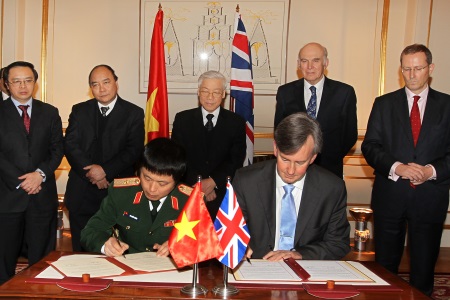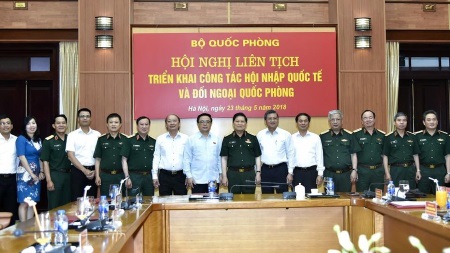As the leading agency of the Ministry of National Defence in foreign relations, in the past 55 years (May 28th 1964 – May 28th 2019), the Foreign Relations Department (FRD) has simultaneously fulfilled its assigned tasks. Bringing into play this glorious tradition, the Department has synchronously and proactively been implementing measures to improve the quality and efficiency of defence diplomacy in the time of international integration, making contributions to the protection of the Homeland by peaceful means.
 |
| The signing of the Agreement on the Working Group between Vietnam’s defence diplomacy agency and the UK’s defence diplomacy agency |
To conduct the task of receiving and managing the military experts and technical and logistics materials from friendly countries assisting Viet Nam in the struggle against the French colonialists and the human and material resources of Viet Nam supporting Laos and Cambodia, the agency of foreign relations under the Ministry of National Defence was founded in the early 1950s and gradually developed in accordance with the revolutionary requirements and tasks. The precursors of the Foreign Relations Department, Ministry of National Defence included the Special Committee for Festivities, the Office No.2 for International Interaction, the Secretary Office for Foreign Relations, and the Office for Foreign Relations. In the 1960s, when the war against the U.S. invasion became fiercer, the Party managed to combine both military fighting and political struggle. At that time, a number of friendly countries not only protested the U.S. war in Viet Nam but also expressed their willingness to assist Viet Nam with experts, weapons and equipment. Therefore, it was a demand for the military to establish an agency which was qualified to assist the Ministry of National Defence in managing and directing foreign relations. As a result, on May 28, 1964, the Foreign Contact Department, the Ministry of National Defence was founded. Immediately after its inception, its officers and soldiers were proactive in overcoming difficulties, consolidating the organizational structure, and implementing the tasks; directly making contact and holding discussion with other countries’ military foreign relations agencies, receiving assistance from international friends for our struggle; focusing on exchanging ideas on fighting tactics and joining fighting alliance to force the U.S. to realize the Paris Agreement, etc., making important contributions to the cause of liberating the South and unifying the country.
In the time of Homeland construction and protection, the Department has managed to grasp the situation, being proactive in giving advice and suggestions to the Party, the State, the Central Military Commission and the Ministry of National Defence on policies and guidelines on defence diplomacy, avoiding being passive and surprised, particularly on strategic issues. At the same time, the Department has proactively cooperated with related departments and agencies in building and implementing defence diplomacy plans and programs for different periods of time, in accordance with the policies and guidelines set by the Party and Government. Thus, it has broadened and diversified the contents and forms of defence diplomacy, developing both bilateral and multilateral defence relations deeply and practically, elevating the prestige and status of Viet Nam in international arena, making contributions to building strategic trust, maintaining peace and stability in the region, creating a favorable condition for social-economic development, consolidating political security, and firmly protecting sovereignty, unity, and territorial integrity of the Homeland.
In the coming time, it is estimated that peace, stability and development are still main trends in the world. However, in the time of globalization and ever deeper and more broadened international integration, there remain potential and unexpected factors that can cause instability and uncertainty for the region and world; countries will both manage to cooperate with, compete and fight against each other for their own national interests; local wars, sovereign disputes, and ethnic and religious conflicts will remain complicated. These factors would significantly impact on our national defence and security, and diplomacy. Therefore, the defence diplomacy would bear ever higher demands. To meet its functions and assigned tasks, the Department has drastically and synchronously been implementing a number of measures, with a focus on the following ones.
 |
| The joint Conference on the work of international integration and defence diplomacy in 2018 |
Firstly, successfully performing the function of giving advice to the Central Military Commission and the Ministry of National Defence on defence diplomacy. The Department continues to thoroughly grasp the Party’s guidelines on foreign affairs and military and national defence work, focusing on the 8th Central Resolution No.806-NQ/QUTW (XI tenure), dated October 25th, 2013, on the “Homeland Defence Strategy in the new situation”, the Resolution No.22-NQ/TW, dated April 10th, 2013 by the Politburo on “International Integration” and the Resolution No.806-NQ/QUTW, dated December 31st, 2013 by the Central Military Commission on “International integration and defence diplomacy until 2020 and beyond”. Grounded on those documents, the Department has closely cooperated with agencies, units and research institutes inside and outside the armed forces in analyzing and exactly predicting the domestic, regional and international situations, then giving advice to the Central Military Commission and the Ministry of National Defence on planning measures to implement defence diplomacy in an “active, proactive, firm, flexible, and effective” manner. In addition, it has focused on suggesting policy and guideline on managing international relations at the strategic level, particularly the contradictions, differences, and sensitive issues relating to national defence and security. First and foremost, the Department should give advice to the Central Military Commission and leaders of the Ministry of National Defence on directing agencies and units to vigorously implement the Plan on “Defence international integration on defence towards 2020, with a vision towards 2030”, in line with the road map. In the time when our country is deepening and expanding international integration, with the intertwined opponents and partners, the Department keeps thoroughly grasping the Party’s viewpoint on opponents and partners, being steadfast in strategic goals and principles while flexible in policy, combining cooperation with struggle, resolutely and persistently struggling to protect national interests, and following Ho Chi Minh’s thought and principle of “being firm in objectives, flexible in strategies and tactics” in defence diplomacy. At the same time, it has managed to undertake researches and give advice to the Ministry of National Defence on building strategies and overall plans on defence diplomacy, in line with the guidelines and policies of the Party and State, the Army’s unique characteristics, and the international practices, clearly expressing the motto and message that Viet Nam is a friend, reliable partner, and responsible member of the international community.
Secondly, enhancing the effectiveness of state management of defence diplomacy. As the leading agency in defence diplomacy, the FRD has regularly reviewed and given suggestions on building and completing mechanisms and regulations on international integration and defence diplomacy. Therefore, it has made contributions to the creation of a synchronous legal corridor for agencies and units’ implementation. To effectively implement the defence diplomacy, attention has been paid to consolidating the Department’s organization, making it strong politically, ideologically and organizationally; ensuring it a “compact and strong” unit, in line with the Central Military Commission and the Ministry of National Defence’s orientation in building the military organization and the demands of defence diplomacy in the new situation. In addition, emphasis has been placed on the task of political and ideological training, consolidating and building a contingent of officers and cadres with strong political will, comprehensive capability, sharp thinking, professional competence, and good command of foreign languages, meeting the short-term and long-term demands. The Department has cooperated closely with the Ministry of Foreign Affairs in conducting defence diplomacy at the strategic level and improving the effectiveness of foreign relations at the lower levels, with a focus on the activities of the Border Guard Force, the Coast Guard, and the Navy. Due regard has also been paid to managing and giving instructions on units and agencies’ implementation of international cooperation in accordance with their tasks and functions; actively participating in directing the propaganda of defence diplomacy in line with the direction of the Central Military Commission and the Ministry of National Defence.
Thirdly, fostering bilateral defence cooperation and proactively participating in multilateral defence cooperation mechanisms. For bilateral defence cooperation, the Department has managed to give advice to the Central Military Commission and the Ministry of National Defence on promoting relations with key partners, implementing the agreed cooperation frameworks in a more realistic manner, bringing benefits to both sides. Priority has been given to fostering the relations with neighboring countries, major powers, ASEAN countries, and traditional partners; consolidating the relations with potential partners. The contents of cooperation focus on several key aspects, such as the exchange of high-ranking delegations, war aftermath recovery, search and rescue, defence industry, maritime security, cyber security, and training, etc. For multilateral cooperation, significance has been attached to participating in cooperation mechanisms within the ASEAN framework and those led by the ASEAN. Meanwhile, importance has also been attached to taking participation in multilateral exercises in the aspects of humanitarian aids, war aftermath recovery, and peace keeping into consideration. In the time to come, the Department will bring into play all its human and material resources and proactively collaborate with related agencies to successfully organize military and defence meetings and field activities in 2020 when Viet Nam undertakes the ASEAN Chairmanship.
Being proud of its 55-year-long tradition of construction and development, generations of the Department’s staff members will manage to successfully fulfill all assigned work, deserving to be the leading agency in giving strategic advice to the Central Military Commission and the Ministry of National Defence on defence diplomacy, making contributions to the firm protection of the Fatherland - the Socialist Republic of Viet Nam.
Lt. Gen. Vu Chien Thang, Director of the Foreign Relations Department, Ministry of National Defence